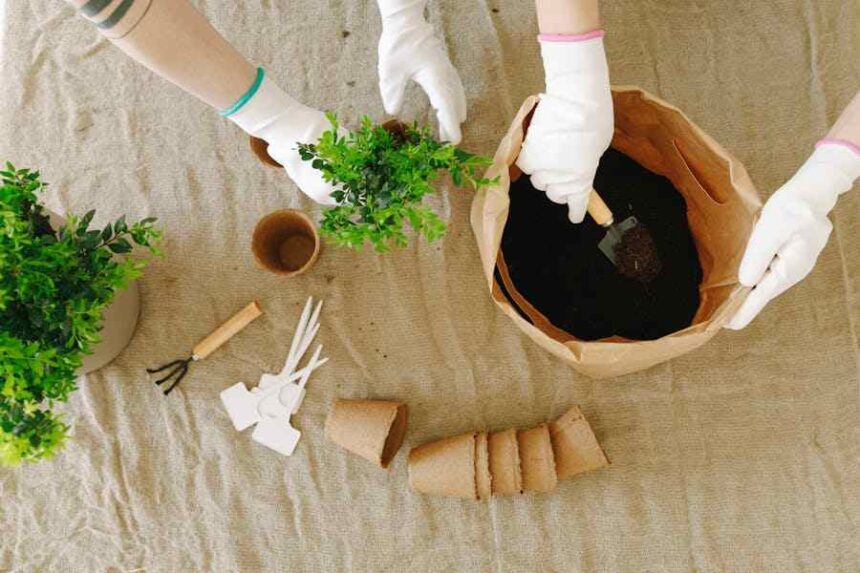Mulch is one of the most versatile and beneficial tools in gardening. Whether you’re growing flowers, vegetables, or shrubs, mulch plays a vital role in creating a thriving, low-maintenance garden. It is simply a layer of material—organic or inorganic—that you place on the surface of the soil.
- 1. Retains Soil Moisture
- 2. Suppresses Weeds
- 3. Regulates Soil Temperature
- 4. Improves Soil Health
- 5. Prevents Soil Erosion
- 6. Enhances Aesthetic Appeal
- 7. Reduces Plant Diseases
- 8. Attracts Pollinators and Beneficial Insects
- 9. Prevents Soil Compaction
- 10. Saves Time and Effort
- Choosing the Right Mulch
- Help Your Plant Thrive
While its aesthetic appeal often gets noticed first, the benefits it brings to your plants and soil are equally, if not more, impressive. Here’s an in-depth look at the many ways mulch can help your plants thrive.
1. Retains Soil Moisture
One of mulch’s primary benefits is its ability to conserve soil moisture. By acting as a protective layer, mulch reduces the rate at which water evaporates from the soil surface. This is especially crucial during hot summers when the sun can dry out soil quickly.
With a layer of mulch in place, your plants can enjoy consistent moisture levels, reducing the need for frequent watering. This is particularly useful in areas prone to drought or for gardeners who want to minimize water usage.
Pro Tip:
Use organic mulches, like straw or wood chips, for added moisture retention in flowerbeds and vegetable gardens.
2. Suppresses Weeds
Your plants compete with weeds for vital nutrients, water, and sunlight. Mulch creates a barrier that prevents sunlight from reaching weed seeds, effectively reducing their ability to germinate and grow.
A thick layer of mulch ensures that weeds are kept at bay, saving you hours of backbreaking labor and allowing your plants to grow without unnecessary competition.
Pro Tip:
Spread 2–3 inches of mulch around your plants, but avoid piling it directly against plant stems to prevent rotting.
3. Regulates Soil Temperature
Extreme fluctuations in soil temperature can stress plant roots.Mulch helps to regulate soil temperatures all year round by acting as an insulating layer.
- In Summer: It keeps the soil cooler by shielding it from the sun’s intense heat.
- In Winter: It helps retain warmth, protecting roots from freezing temperatures.
This temperature stability promotes healthy root development and reduces stress on plants, leading to better growth.
4. Improves Soil Health
Organic mulches, such as shredded bark, compost, or grass clippings, break down over time and enrich the soil with nutrients. This process improves soil fertility and structure, creating a healthier environment for plants to grow.
Decomposing mulch also attracts beneficial microorganisms and earthworms, which play a vital role in aerating the soil and improving nutrient availability. Over time, this enhances the overall vitality of your garden.
Pro Tip:
Replenish organic mulch regularly as it decomposes to maintain its effectiveness and nutrient benefits.
5. Prevents Soil Erosion
Heavy rain and wind can erode the topsoil, washing away valuable nutrients and leaving plants vulnerable. Mulch acts as a protective cover, reducing the impact of rainwater and minimizing runoff.
By keeping soil in place, mulch helps maintain soil quality and ensures that your plants continue to receive the nutrients they need.
6. Enhances Aesthetic Appeal
Mulch doesn’t just benefit plants—it also improves the appearance of your garden. A well-mulched garden bed looks neat and tidy, adding a finished touch to your landscaping.
Colored mulches, like red or black wood chips, can complement the color of your plants and flowers, creating a striking visual effect. Whether you prefer a natural or decorative look, mulch enhances the overall beauty of your garden.
7. Reduces Plant Diseases
Certain plant diseases, like fungal infections, can spread through soil. When water splashes soil onto plant leaves, it can carry disease-causing pathogens. Mulch acts as a protective barrier, preventing soil from splashing onto plants during rain or watering.
Additionally, by improving air circulation around plants, mulch reduces the likelihood of fungal growth, keeping your garden healthier.
Pro Tip:
Use mulch made from clean, untreated materials to avoid introducing pathogens into your garden.
8. Attracts Pollinators and Beneficial Insects
Mulching with organic materials like straw or bark can create a habitat for beneficial insects, such as pollinators and predatory bugs that help control pests. For example, beetles and spiders may take shelter in mulched areas, assisting in natural pest control.
Some mulches, like pine needles, also release subtle fragrances that attract pollinators like bees, which are essential for flowering plants and crops.
9. Prevents Soil Compaction
Over time, garden soil can become compacted, reducing the space for air and water to move freely. Mulch creates a cushioning layer that minimizes the impact of foot traffic, rain, or heavy watering, preventing the soil beneath from becoming dense and compacted.
This loose soil structure allows plant roots to grow more easily and absorb nutrients and water more effectively.
10. Saves Time and Effort
Ultimately, using mulch simplifies your gardening routine. By reducing watering, weeding, and soil maintenance needs, mulch allows you to spend less time on chores and more time enjoying your garden.
It’s a cost-effective, low-maintenance solution that delivers long-term benefits to both novice and experienced gardeners alike.
Choosing the Right Mulch
The type of mulch you choose depends on your gardening goals and preferences. Here are some popular options:
- Organic Mulches: Compost, straw, grass clippings, bark, and wood chips are excellent for enriching the soil and improving fertility.
- Inorganic Mulches: Gravel, stones, and landscape fabric are ideal for decorative purposes and long-lasting weed control.
No matter the type, ensure the mulch layer is thick enough to provide maximum benefits without smothering your plants.
Help Your Plant Thrive
Mulch is a simple yet powerful gardening tool that offers a wide range of benefits for both plants and gardeners. From conserving moisture and suppressing weeds to improving soil health and aesthetics, mulch supports plant growth while reducing the time and effort required for garden maintenance.
By choosing the right mulch and applying it correctly, you can create a thriving, beautiful garden that brings joy and satisfaction year-round. So, grab your mulch and give your plants the care they deserve!




